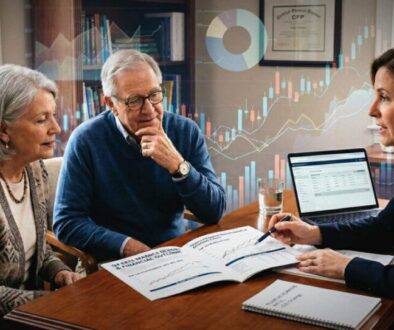Uncertain economy leaves Americans insecure about financial planning

Americans are becoming more careful – and insecure – about their financial planning but are more willing than ever to get expert help an uncertain economy seems to become less stable, according to two recent surveys.
The surveys illuminate how consumers and planners are dealing with changing markets amid the cloud of economic uncertainty.
Equitable’s second-quarter consumer finance survey of 1,000 U.S. adults found that only 42% of Americans feel prepared to handle today’s volatile economic environment. Concerns over tariffs, market swings, and a possible recession weigh heavily, with more than two-thirds saying they fear the unpredictable economy could sabotage their financial goals.
Yet, the outlook brightens for those who work with a financial professional. Nearly six in 10 respondents who have an advisor said they feel prepared to manage evolving economic concerns — roughly twice the level of confidence reported by those without one.
Uncertain economy: ‘Navigating a financial fog’
“Americans are navigating a financial fog — concerns about tariffs, geopolitical uncertainty, market volatility and lingering recession fears have left many second-guessing their next move toward a secure financial future,” said Nick Lane, president of Equitable.
That finding dovetails with Goldman Sachs Asset Management’s recently released Annuity Industry Survey, which offers an insurer’s-eye view of similar concerns. Carriers also cited U.S. economic slowdown and market volatility as their two top risks in 2025, with 76% and 66%, respectively, naming those issues as critical. Insurers, like consumers, are exploring ways to diversify — moving beyond U.S. equities and into international, emerging markets, and private investments.
Both surveys highlight a shared reality: Anxiety about the future of an uncertain economy has pushed individuals and institutions to rethink how they save, invest, and protect themselves.
According to Equitable, about half of consumers say they plan to cut discretionary spending, boost savings, and adjust their investment portfolios in response to the unpredictable economy. But those with an advisor are more proactive: 54% plan to make changes to their investments or product mix, compared to just 36% of those without professional guidance.
A willingness to ‘rethink strategies’
“There’s clearly a willingness to adjust and rethink strategies among those who have support,” said Jody D’Agostini, CFP, a financial advisor with Equitable Advisors. “We encourage clients to stick with a plan that reflects their personal goals and risk tolerance — not the headlines of the day.”
A notable finding from the Equitable survey is Americans’ growing appetite for protection. Nearly two-thirds of stock market investors said they are willing to trade the potential for higher returns for protection against losses — a preference echoed on the institutional side. Goldman Sachs found that nearly nine in 10 insurers (88%) now offer structured investments or defined-outcome strategies such as registered index-linked annuities (RILAs), which aim to limit downside risk while participating in market gains.
On the product development front, Goldman reported that insurers continue to prioritize RILAs, with 77% focusing on these products, which surpassed traditional variable annuity sales in 2024. Yet insurers are also revisiting traditional guaranteed income products. Notably, the proportion of insurers emphasizing traditional lifetime-income variable annuities rose to 60%, up from 44% the previous year.
In Equitable’s consumer data, that emphasis on protection resonates clearly. Faced with a “whiplash” market and economic ambiguity, investors increasingly want solutions that offer downside protection, even if it means capping potential upside.
Technology a potential game-changer
Both surveys also point to technology as a potential game-changer. Equitable found that those without an advisor rely more on social media platforms like TikTok and Instagram for financial guidance — a trend that raises significant questions about the quality of advice. Meanwhile, the Goldman Sachs survey revealed that 90% of insurers believe artificial intelligence will play a crucial role in educating clients about annuities and guaranteed income options in the future.
The Goldman Sachs survey also explored longer-term retirement income trends, finding that while RILAs remain the near-term focus, insurers expect in-plan annuity options — integrated into 401(k) plans or target-date funds — to gain prominence over the next three years. Nearly two-thirds of insurers ranked in-plan retirement income as a top three priority, though adoption has been slow so far.
This forward-looking view aligns with the broader theme of protection and preparedness that Equitable found among consumers. Both surveys suggest that, whether through professional advice or innovative products, Americans and their financial institutions are searching for stability in a turbulent environment.
Professional guidance more important
Perhaps the clearest takeaway from Equitable’s research is the outsized impact of professional guidance. Eighty percent of respondents with an advisor said they turn to that advisor first for advice, versus friends, family, news outlets, or social media. Among those without an advisor, friends and family remain the primary source of guidance, followed by financial news and social media — a potentially risky strategy given the complexity of today’s financial landscape.
The role of the advisor becomes even more critical in helping clients prioritize their long-term goals over daily market noise. As D’Agostini noted, “We help clients tune out the noise and stick to a plan that reflects what’s truly important to them.”
Both reports reflect an economic moment marked by caution and change. Equitable’s survey underscores how individual investors, left on their own, often feel ill-equipped to meet the challenge. Goldman Sachs’ survey shows how insurers are responding, with a focus on product innovation, diversification, and technology.
Together, the surveys sketch a picture of an uncertain economy — and a public — that is uneasy but adaptable, increasingly willing to seek help, and focused on protection and stability.
In the words of Equitable’s Nick Lane: “Even in a fog, a trusted guide can make all the difference.”
© Entire contents copyright 2025 by InsuranceNewsNet.com Inc. All rights reserved. No part of this article may be reprinted without the expressed written consent from InsuranceNewsNet.com.
The post Uncertain economy leaves Americans insecure about financial planning appeared first on Insurance News | InsuranceNewsNet.





